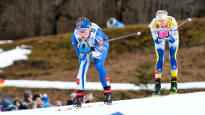The poor snow conditions in Central Europe speak volumes for Nordic skiing. The latest was the combined world cup next weekend. Next at risk is the Cross Country World Cup in France.
13:58•Updated 14:05
In the United World Cup, two race weekends have been canceled in January. In the coming weekend, there is no planned competition in Klingenthal in Germany, nor in Chaux-Neuve in France on January 20-22. The cross-country skiing world cup in Les Rousses, France at the end of January is next on the slopes.
More decisions about the fate of the Games are expected in the coming days.
The French competition location has had very little natural snow throughout the winter. In terms of competitions, the executive director of the Ski Association Ismo Hämäläinen was not hopeful on Wednesday.
– The current situation is bad. The threat of transfer or cancellation exists, he says directly.
For athletes, the situation is particularly challenging. For example, several skiers have uploaded their best condition under the World Championships. In many national teams, especially the last competition places are redeemed in the tough world cup competitions in January-February.
– The situation is really stressful for the athletes who have invested in being in shape at a certain time of the year and then give their best, former national team skier Martti Jylhä opens to Urheilu.
The International Ski Federation is considering solutions
Problems with the competition calendar draw Hämäläinen into a pensive mood.
– This does not evoke positive thoughts. Plans are constantly being renewed, Hämäläinen states.
Moving World Cup-level competitions to another location on a fast schedule is challenging. There are a lot of moving parts, and the whole is big. A key influencing factor is also the TV rights of the competitions.
The difference between the sports under FIS and, for example, the Biathlon World Cup, is that the International Biathlon Federation sells the TV rights for the competitions centrally. In FIS sports, the Ski Federations of different countries sell their rights themselves.
– Regional partners and sponsors are involved, and the TV rights are for a certain weekend, Jylhä opens a complex whole.
One possibility for transfers is that the competition venue of the previous or the following weekend takes over the competitions to organize them. According to Jylhä, even at that time there will be a financial loss in some revenue sub-areas.
He says that the International Ski Federation is working on a solution similar to the centralization of TV rights.
In the future, one possibility to secure the Games in Central Europe could be to move to compete above sea level in conditions with more snow.
In the opinion of both Jylhä and Hämäläinen, FIS’s requirements towards competition organizers must be at a different level in the future. The competition location should have a functional opportunity to preserve and make snow.
– Preserved snow solutions should be mandatory, Hämäläinen emphasizes.
This season’s situation is dire
According to Hämäläinen, for the rest of the season, the Finnish Ski Federation is considering whether additional, previously canceled, competitions could be organized in connection with the Salpausselkä Games in March. However, this does not help in preparing for the World Cup.
– For example, international competitions in cross-country skiing are in danger of being canceled before the World Championships, Hämäläinen says seriously.
– It’s a bummer for an athlete that the most important qualifying competitions are missed or preparation for them becomes difficult, Jylhä gives the athlete’s perspective.
In the future, according to Jylhä, we have to react to the changing winters when the competition calendar is planned. When preparing the calendar, FIS tries to avoid long distances and back and forth transfers.
FIS has preliminary plans for calendars for several years, but they are locked in the spring before the season. Last-minute filings can still be done in September.
– Each year’s competition calendar is a joint game between all Ski Federations, Jylhä opens.
The uncertainty of winters must be quoted more strongly in the future.
– In the future, we have to think about where to exercise in different sports based on the prevailing or previous weather conditions, Hämäläinen says.
